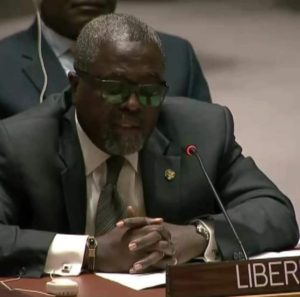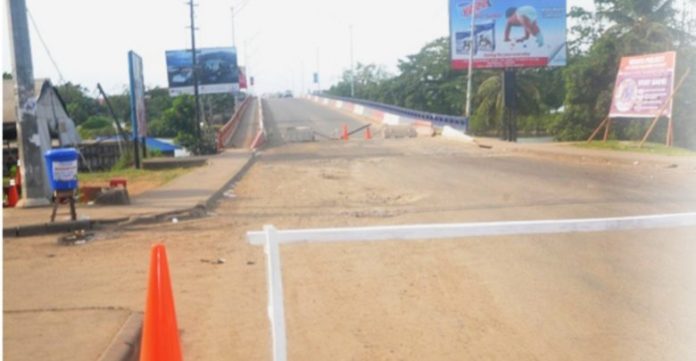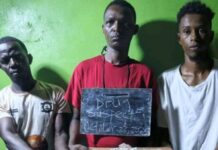By Amb. Lewis G. Browne, II
Liberia is at war!
The Liberian Government needs to treat this virus more seriously, as it would a war involving bullets and rockets. Like bullets and rockets, the Coronavirus kills.
People are scared, and are right to be so.
Various models are already pointing to projections of deaths on the African Continent due to COVID-19 of anywhere from 300,000 to 3.3 million, and up to 1.2 billion infections!
At this writing, the official count of confirmed cases in Liberia is 82. For many countries, this would be good news. For Liberia, it is frightening. Our official fatality rate is 8.5%, and with more testings, our actual confirmed caseload could be 820 or 8200, each of which can easily generate as many as 50 contacts. Of course, there are other inherited and evolving challenges to our capacity to fight the pandemic.
Liberia’s health system is weak. Our doctor to patients ratio is believed to be 1:15,000; medical facilities, especially private facilities, are without needed masks, gloves, protective gowns, shields and ventilators (estimated in the country to be anywhere from 1-5). Perhaps this concerned the Chief Medical Officer (CMO), Dr. Francis Kateh, when he cryptically said at a recent press conference, “Liberians, let us pray that we do not reach 20/30 confirmed cases!”
The National Public Health Institute (NPHIL), responsible to help our country track and manage infectious diseases, is closed because of confirmed infections to its staff. So, too, is Jahmale Clinic, a private diagnostic facility, and a number of departments of the John F. Kennedy Hospital, the largest referral hospital in the country. The President of the World Lebanese Cultural Union ordered a few of his members quarantined after announcing that one with whom they closely associated tested positive at the Beirut International Airport, immediately upon arrival from Liberia.
Said a dear friend, who is worried about her family and the country, “At this rate of transmission, and what we are currently doing to curb it, it really is a case of ‘when’, and not ‘if’, all of us will contract the virus, despite our best individual efforts.” She is right. Although currently in a self-imposed lockdown with her children, designated an “essential staff”, her husband who is not a healthcare worker or a security personnel, is compelled to go to work, even if his bosses are not. Each day he steps out, is another day he is forced to risk the life of his wife and children.
For this Liberian family, and for many of our people, some of whom must be out daily to survive, the unsettling truth is that the government has not prepared as quickly, as it could have. Such is the high risk of the transmission of the virus that unless everyone is doing his/her share to be reasonably safe, no one can truly be safe.
This is why, despite claims from some legal minds, particularly as a reinforcement to the public health emergency, I support the Declaration of a State of Emergency, so that where one declaration may not prove to be far-reaching and effective enough, the other possibly can. To succeed against COVID-19, we must employ all of the available tools in our box, and rather than piecemeal, we must respond comprehensively and decisively.
Difficult as it admittedly is, Liberia’s presenting reality is that we need to lock the country down fully and completely, and preferably, at a renewable period of 15 days. The lockdown is not a solution onto itself. It must be complemented by a more effective process of identification of infected persons through widespread testings. Such persons must be safely isolated and treated, and their contacts which should be limited by reason of the lockdown, closely monitored and possibly quarantined.
A neighboring President expressed the challenge of our shared reality more profoundly when he said, “We know how to fix the economy (after shutting it down), but we don’t know how to fix lives when it is lost.” This summarizes the difficulty and urgency of our dilemma. And yet, it is one we cannot reasonably avoid.
No doubt, the difficult choice between lives and livelihoods are ones no one would wish to make. At the risk of seeming simplistic, we must be alive before we can protect livelihoods. This is why, the recently-passed Joint Resolution of the Legislature, which ordered arguably incongruent economic measures with a sense of higher priority, and at the same time, lent a piecemeal and inconclusive approach to directly fighting the virus and thereby saving the lives of our people, for which the emergencies were actually declared, is disappointing and frustrating.
The human-to-human transmission is anything but discriminatory. Our response must be similarly indiscriminate, serious and comprehensive. All of us need to fight with, and for all of us, or none of us will be spared. Do we really need to risk the life of any “essential staff” and their families? Must we really risk the life of any market woman, and her family? Boy scout, and his family? Should every life not matter?
I cannot emphasize the point enough: It is time to lock the country down! And test, test, test. All Liberian lives matter. Except for healthcare workers, security personnel and individuals that are trained to assist in the health response, all must be off the streets and indoors for at least 15 days. And so, the provision of free food, water and electricity are commendable, only if used to incentivize the implementation of a full and complete lockdown of the country.
To win this COVID-19 war – and we are not winning at this moment – rather than follow, we must get ahead of the virus, and do so as quickly as we can. We must give the health authorities the fighting chance they need to save our lives.
Indeed, this is a difficult time for Liberia. It is also a difficult time for the world. The world is right to expect that Liberia will undertake its fair share of heavy-lifting in the global fight against the pandemic. It is in our own self-interest.
However heavy the weight of each decision to save lives will be, the presenting crisis demands that we act quickly, decisively and comprehensively. Also, where we lack the wherewithal to fight as effectively as we can, it must not shame us to ask for the help we need.
We need ventilators, masks, gloves, medical shields and protective clothing. More importantly, we desperately need testing kits. A source claiming knowledge confided that our current national capacity to test is barely 2,000 strong. I can only hope my source is wrong!
I therefore add my voice to those of the Secretary-General of the United Nations, the Director-General of the WHO, and many others including former President Ellen Johnson-Sirleaf, in calling for a global approach to the fight against the pandemic. We understand that countries with means are self-prioritizing.
However, COVID-19 which presents a public health threat to all of us will not be ended until all countries are free of its deadly sting.
This is why we are grateful to ECOWAS, the IMF, the World Bank, Jack Ma and all others for their assistance and support to our country, and other countries like ours. To the international financial institutions, we wholeheartedly appreciate the waivers and financial reliefs provided.
But countries like ours are still finding it especially difficult to source the medical supplies we need even if we have money to purchase same because we simply cannot compete with others in getting them.
This is especially true of testing kits, which we cannot produce, and yet, we desperately need, if we must give ourselves the minimum fighting chance we will need to survive.
As we try to help ourselves, we appeal to the world: Please, help us!
About the Author:

Amb. Lewis G. Browne,II is the immediate past Liberian Ambassador to the United Nations (UN) and former Minister of Information, Cultural and Tourism of Liberia. He remains one of Liberia’s outstanding diplomats haven represented the country in several capacities at the UN.

























Comments are closed.